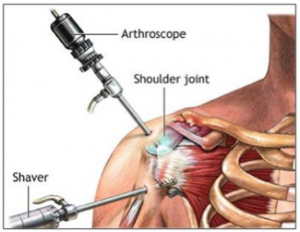Shoulder instability is something which is best defined by the actual name. Shoulder instability is a condition where your shoulder is unstable. It is something where the connective tissue surrounding your shoulder joint starts to loosen or is traumatically damaged. Your shoulder joint is actually constructed of a ball and socket joint.
The tissue which holds your shoulder joint together is a strong connective tissue including ligaments and cartilage along with the rotator cuff. This tissue has a group of muscles call the rotator cuff muscles which actively hold your shoulder joint in place where it should be and provide stability for your shoulder.
There are particular movements which apply direct force to your shoulder ligaments. Some of these movements include throwing a ball or falling on your outstretched arm. If these movements are repeated enough or if they are sustained once but they are particularly dramatic it can stretch the connective tissue inside of your shoulder or it can lead to a torn tissue. If this happens the support that you would normally receive from your connective tissue diminishes and the joint becomes unstable.
As a result shoulder instability means that your upper arm bone is no longer held in place where it should be and instead is allowed to move partially out of socket if you complete certain arm movements. If this is a regular occurrence it can cause dislocation of your shoulder.
Shoulder instability is typically caused by a traumatic incident where your shoulder is partially or completely dislocated. But it can also take place during contact sports like basketball, rugby, skateboarding, football, or water polo. Unusual movements or excessive external rotation on your shoulder can also cause the instability to take place.
Shoulder instability is not usually something which happens immediately but rather something which happens gradually. Shoulder instability is something that typically  occurs in conjunction with bad throwing techniques or faulty swimming strokes. In the traumatic situation in a fall or car accident, the instability is acute and there is a very high level of recurrence.
occurs in conjunction with bad throwing techniques or faulty swimming strokes. In the traumatic situation in a fall or car accident, the instability is acute and there is a very high level of recurrence.
Patients who experience instability might immediately experience fleeting symptoms, but no real pain. The first sign might be simple partial dislocation of your shoulder. Other signs might include a shoulder ache when you try to participate in regular sporting activities. If you landed on an outstretched arm you may experience pain associated with this traumatic incident but you might not realize that it is actually shoulder instability. Following such an incident you might have pain when you try to rest at night or when you try to use your shoulder for other activities. Many patients who have suffered from shoulder instability claim that the pain was very subdued initially but that their shoulder never felt the same.
You might also begin to notice a popping sensation when you try to complete certain shoulder movements. Some patients experience a loss of power in their shoulder or when they try to lift their arm over their head they feel very weekend. Some patients have very tender shoulder joints but in the most severe cases the instability causes regular partial dislocation or regular full dislocation. In instances such as this is imperative to meet with your doctor and orthopedic surgeon to remedy the situation.
The top shoulder specialist in Phoenix is Dr. Adam Farber at Phoenix Shoulder and Knee. Nonoperative and operative treatments are offered, including minimally invasive arthroscopic procedures. Most insurance is accepted, call (480) 219-3342 today!



